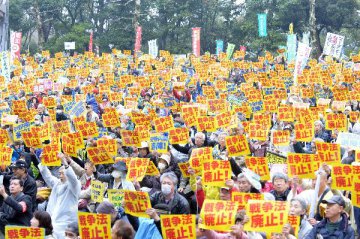Japanese Prime Minister Shinzo Abe' s ambitiously blueprinted security laws took effect on Tuesday, historically switching Japan back to a fighting stance for the first time in seven decades, as the controversial laws ordered Japan's Self-Defense Forces (SDF) to stand ready to particulate in armed conflicts overseas.
By reinterpreting the country's war-renouncing Constitution, the warlord prime minister shook off the restraints of Article 9 of the supreme law over the use of force and the exercise of the right to collective self-defense, and vowed to proactively contribute to regional and international peace and stability. It is for sure that the security laws will not follow the country's pacifist Constitution to ensure and enhance Japan's security, but will only serve to endanger the Japanese public's right to live in peace and, more importantly, pose a severe challenge to peace in the Asia-Pacific region, which is already vulnerable.
The security laws give a green light to the SDF to rescue Japanese hostages detained by terrorist groups, but Japan has indicated that it has no intention to engage in battles against such extremist militants, since it already paid a bloody price when it tried to proactively insert itself into Middle East dealings.
In the Asia-Pacific region, the security laws are not the right remedy to resolve any problems facing Japan since some issues require Japan to reflect on itself over history so as to enhance ties and trust with its neighboring countries and Japan also needs the cooperation of the international community.
However, the only purpose of the controversial laws are to ride the coattails of Uncle Sam's "pivot to Asia" strategy and pave the way for Japan to further meddle in regional affairs -- not only territorial disputes with its neighbors, but also issues for which Japan is not a stakeholder -- with the United States, in a saber-rattling way.
Along with Abe's value-oriented diplomacy, the security legislation increasingly empowered Japan to promote weapons assistance and defense technology transfer to regional countries close with Japan and the United States, risking loss of regional geopolitical balance through triggering an arms race.
By doing so, Abe's elaborate ruse to contribute to regional peace and stability has been exposed and once again unmasked Japan as a trouble maker and a pawn of the United States in interfering in Asia-Pacific region affairs. And it is more dangerous that, for Japan, the Abe administration is trying to demonize the country's closest neighbors so that the historical revisionists that comprise the leader's coterie have an excuse to jeopardize the postwar order and remilitarize Japan.
Looking back through history, the current chapter being manipulated by the Japanese prime minister has a German version in the 1930s when the Weimar Constitution was trampled on and Nazi Germany ruthlessly stormed Europe thereafter. Imperial Japan, at that time, occupied the Korean Peninsular and northeast part of China and prepared for widening its aggressive onslaught to the Asia-Pacific region.
Let the future annals of Japan's history not read that it was foolish enough to allow history to repeat itself, as history has already confirmed that such echoes of aggression will likely not end well for Japan.



















Latest comments